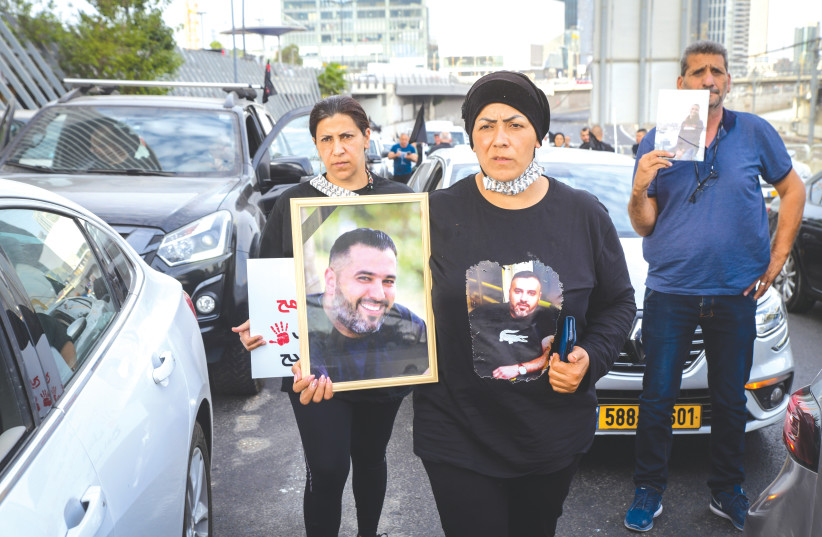Arab Israeli leaders decried a new plan to insert the Israel Security Agency (Shin Bet) into the fight to combat violence in Arab communities, warning of a dangerous level of police surveillance that could strip innocent civilians of their rights.
“I’m afraid that the government and the prime minister still don’t have the real political will to deal with the [criminal] organizations and secure the Palestinian citizens of Israel,” said Arab Israeli MK Aida Touma-Sliman (Hadash-Ta’al).
The government is “still trying to use our fear and being victims of crime to pass very bad suggestions that are meant to threaten the basis of the community’s civil rights,” she said.
Touma-Sliman spoke just a day after Prime Minister Benjamin Netanyahu unveiled his plan, following a bloody weekend in which eight Israeli Arabs were murdered, five of them in a car-wash shootout in the northern town of Yafia.
Murder in the Arab sector
Over 100 Israelis in the Arab sector have been murdered since the start of 2023. At this time last year, the community had only lost only a third of that amount, according to the nonprofit Abraham Initiatives group, an organization that tracks Arab Israeli crime rates in the Jewish state.

The fatal crime spike has led many Arab community leaders to blame Netanyahu and National Security Minister Itamar Ben-Gvir (Otzma Yehudit) for their inaction.
Yet many of these leaders fear the Shin Bet’s involvement, calling it undemocratic and dangerous. Touma-Sliman also pointed the blame directly at Ben-Gvir, calling him a “racist” who supported “terrorist, fascist organizations” and doomed the security of Arab Israelis from the start.
“In my opinion, Ben-Gvir was not supposed to be in the position from the beginning,” Touma-Sliman said.
The Shin Bet is Israel’s primary security agency, its internal security service tasked with investigating and targeting terrorists. Though it has previously been involved in domestic cases that could be considered terrorism, leaders within the agency itself have protested deeper involvement in domestic matters. However, on Sunday evening, Netanyahu doubled down on his plan, noting that the recent crime wave in Arab communities makes the matter urgent.
Human and civil rights organizations criticized the agency’s involvement even further. Suhad Bishara, legal director of the human rights legal aid organization Adalah, wrote that Netanyahu’s plan was “particularly alarming” given that it “further threatens the basic rights of a group that is already systematically targeted and oppressed by the police.
“Moreover, if the government promotes legislation to expand the powers of the Shin Bet for this purpose, we would oppose it on the grounds that it intended to establish an enforcement system specifically for one ethnic and national group, and thereby entrench two separate legal systems – one for Palestinian citizens of Israel, and the other for Jewish-Israeli citizens – and is therefore blatantly racist,” she wrote.
Gadeer Nicola, director of the Arab Society Department at the Association for Civil Rights in Israel, agreed with Bishara, noting that the Shin Bet’s involvement would “blur the boundaries between crime and terrorism – both in practice and in public mentality.”
Why are Arabs rejecting Shin Bet involvement?
Meisa Irshad, a founder of Women Against Weapons and legal adviser to the anti-gun advocacy organization Gun Free Kitchen Tables, emphasized that Arab Israelis were afraid of further surveillance.
“Our biggest fear is that the Shabak [Shin Bet] will use illegal methods of investigation, and obviously invade human rights and suspects’ rights in terms of criminal process,” she said.
Irshad said that this potential illegality was why top agency officials objected to its involvement in Arab community violence. She also pointed to the Shin Bet’s history of collaborating with Palestinian criminals, giving them weapons and influence.
“The Shabak is part of the problem; it is not a solution in this case,” she said.
Nadira abu Dbai Saadi, a project manager at Women Against Violence, added that the Shin Bet’s imposition would be “very dangerous. The issue is the violence, the issue is the criminality, the issue is that the police are not doing what they should be doing.”
Saadi doesn’t think that “the Shabak will be our savior,” stressing that the Shin Bet was already involved in Arab activist communities in their investigations. She did not want this invasive behavior to become normalized.
“They will go into your privacy, hear your calls, look after your phones and the internet and everything; it’s kind of a dictatorship, it’s North Korea: to know you are all the time on the focus of the security system,” she said.
However, Nael Zoabi, an Arab Israeli and former elementary school principal in the northern town of Nein near Nazareth, supported the Shin Bet’s imposition, calling it a “very high-quality organization, successful and skilled.”
He said that the agency would restore democracy in Arab communities that he believes currently have no leader.
“[Arab leaders] represent the Palestinian Authority more than they represent Arab society in Israel,” Zoabi said. “This is why it is not good that they blame the police for their problems.”
